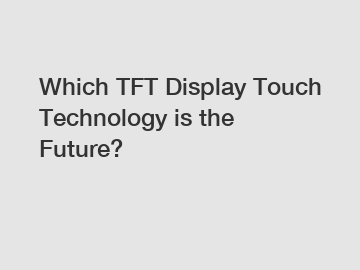Which TFT Display Touch Technology is the Future?
In today's fast-paced world, touch technology has become an integral part of our lives. From smartphones to tablets and even smart home devices, we interact with touchscreens on a daily basis. While there are various types of touch technologies available, TFT (Thin Film Transistor) displays have gained significant popularity due to their superior image quality and versatility. In this blog, we will venture into the realm of TFT display touch technology to explore its future prospects and advancements.
1. A Brief Overview of TFT Display Touch Technology:
TFT, often referred to as active matrix technology, is widely used in the display industry due to its ability to provide sharp, vibrant, and responsive visual output. In conjunction with touch technology, TFT displays offer a seamless and intuitive user experience. The primary touch technologies used in TFT displays include Resistive, Capacitive, Infrared, and Projected Capacitive (PCAP). Each of these technologies has its advantages and limitations, contributing to the ongoing innovation and development within the field.

2. The Rise of Projected Capacitive (PCAP):
Projected Capacitive touch technology has emerged as a dominant force in the TFT display arena due to its exceptional responsiveness, multi-touch capabilities, and durability. PCAP technology employs a grid of microfine wires, making it highly accurate and sensitive to touch gestures. With its ability to detect multiple touch points simultaneously, PCAP has revolutionized the way we interact with touchscreens. From pinch-to-zoom to swipe and scroll gestures, PCAP has become the touch technology of choice for modern devices.
3. The Potential of Infrared Touch Technology:
While PCAP has gained momentum, Infrared (IR) touch technology continues to hold its ground. By using a grid of infrared sensors, IR touch technology provides precise tracking of touch points. Its ability to detect touch irrespective of the surface material makes it highly versatile. Moreover, IR touch technology is known for its robustness and durability, making it well-suited for high-traffic environments such as public kiosks and industrial applications.
4. Gesture Recognition: Unlocking a New Dimension:
To further enhance the user experience, gesture recognition technology is gaining significant attention. Incorporating a combination of sensors and algorithms, gesture recognition enables touchscreens to interpret intuitive hand movements. This technology empowers users to interact with displays by simply waving, pointing, or performing other hand-based gestures. As gesture recognition evolves, it holds the potential to revolutionize the way we interact with touchscreens, enabling a more natural and immersive user experience.
5. The Future Possibilities:
As display technology continues to evolve, the future of TFT display touch technology appears promising. The ongoing advancements in touch sensitivity, durability, and accuracy will continue to shape our interaction with touchscreens. We may witness the emergence of new touch technologies, offering enhanced haptic features, augmented reality integration, and compatibility with flexible and foldable displays. Additionally, the seamless integration of touch technology with other emerging technologies, such as artificial intelligence and voice recognition, will further redefine user interaction.
Conclusion:
In conclusion, the future of TFT display touch technology is undeniably exciting. With PCAP dominating the market, delivering exceptional responsiveness and multi-touch capabilities, it is set to remain the touch technology of choice for many devices. Nonetheless, other touch technologies like Infrared and gesture recognition continue to provide valuable alternatives, catering to specific needs and applications. As display technology advances, we can expect the emergence of new touch technologies that will augment our everyday interactions with touchscreens. Regardless of which technology emerges as the frontrunner in the future, one thing is certain – TFT display touch technology will continue to evolve, enhancing our digital experiences in ways we can only imagine.
Want more information on PM oled, 2.89 inch pmoled display leading, 2.7 inch pm oled custom? Feel free to contact us.
258
0
0

Comments
All Comments (0)